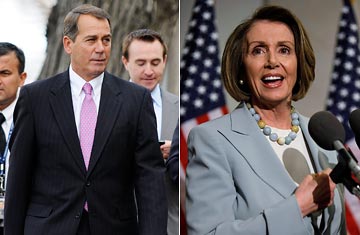
House minority leader John Boehner, left, and Speaker Nancy Pelosi
As both parties brace for the House's deciding vote on health reform, they are framing the issue in starkly different ways. To Democrats, it's one last chance to make the moral argument in favor of reform, political repercussions be damned. "We need courage," said President Obama at a speech in Ohio on Monday. To Republicans, it's all about politics, specifically the possibility that House Democrats will employ a relatively rare procedural maneuver to ram through legislation they can't pass by conventional means, and in the process better position vulnerable members for fall re-election battles. These legislative acrobatics smack of "arrogance" and "cynicism," says Republican Senator John Cornyn.
While House Speaker Nancy Pelosi spent another day wooing votes for a package of still largely unknown changes to the Senate health bill that would bring it more in line with the House bill that passed last year, the GOP line of attack seemed to be gathering momentum. The delayed Congressional Budget Office estimate of how the revamped bill would affect the federal deficit has created a convenient opening for Republicans to shift the narrative from the substance of the Democratic legislation to the process by which it may be passed through Congress.
The parliamentary maneuver that Pelosi is strongly considering and which Republicans vigorously object to (despite having used it themselves often in the past) would have the House "deem" the Senate bill as passed without directly voting on it. The political upside to this is that House members could tell constituents they never voted in favor of the original Senate bill, which contains several unsavory sweetheart deals that the package of fixes would strip away. "The public is already uncomfortable with the process, and this just makes it worse," says Democratic Representative Jason Altmire, who previously voted against health reform and whose vote is now being heavily courted.
But as often happens on Capitol Hill, the reasoning on both sides is dubious. Many Dems' insistence that the maneuver would help them gain political cover in the 2010 election season doesn't make much sense; it's not as if Republicans won't hammer House Democrats over health reform anyway, even if the Dems didn't technically vote for the more controversial bill. For their part, Republicans have previously used the simple-majority reconciliation process many times to pass legislation, even as they vilify Senate Democrats for trying to use the same procedure to make changes to the health bill they passed late last year with a filibuster-proof 60-vote majority. House Republicans also used the procedure of "deeming" Senate legislation passed without a direct vote 35 times during the last Republican-controlled Congress. And none of these instances of parliamentary maneuvering ended up as campaign fodder.
Republicans are also hammering Democrats for making deals in exchange for the votes of individual members. This criticism too is hard to sell on Election Day. Democrats kicked up a similar ruckus during the 2005 passage of the Medicare Prescription Drug Program, when majority leader Tom DeLay threatened to derail the congressional candidacy of one member's son and threatened to withhold funds for then Representative Jim DeMint's Senate race if he didn't vote for the bill. On final passage of the Central American Free Trade Agreement (CAFTA) later that year, to gain Representative Robin Hayes' vote, GOP leaders promised that they would help steer business to a textile company in his district. But these threats, sweetheart deals and rule-bending votes were long forgotten by the next elections. Seniors adore the Medicare Prescription Drug plan, and the U.S. Chamber of Commerce has declared CAFTA a success. If health reform passes, Democrats will be able to tout a number of immediate benefits, including a ban on preexisting exclusions for children and discounts on prescriptions drugs for seniors.
While Republicans are trying to focus on process, Democrats are striving mightily to steer the ship back toward substance and sympathy for those suffering under the current health care system. Last week, during a press conference on insurance-company abuses, Democrats introduced 11-year-old Marcelas Owens, whose 27-year-old mother died of pulmonary hypertension after she lost her job and health insurance. Days later, Obama began a health care speech with the story of an Ohio woman who lost her insurance coverage and is in the hospital with leukemia. Pelosi is in the midst of a week of press conferences with children, seniors, college students and other vulnerable groups that she says will gain from health reform.
In the short term, the GOP tactic to focus attention on process may be working, at least among the Washington press corps. In a briefing on Tuesday, White House press secretary Robert Gibbs fielded more than 20 questions and follow-ups related to the process of passing health care reform. But is the public actually bothered by the convoluted process Democrats may use to pass reform? An NBC/Wall Street Journal poll released on Tuesday and conducted on March 10 showed that just 35% of Americans oppose reconciliation, while 26% supported it and 37% said they didn't know enough about it to have an opinion.
Of course, the intended audience for the GOP talking points on process isn't really the American public. It's nervous House Democrats wondering about the political costs of voting for reform. "We've got to put all the pressure we can on these Democrats to make sure this bill never, ever happens," says House minority leader John Boehner.
